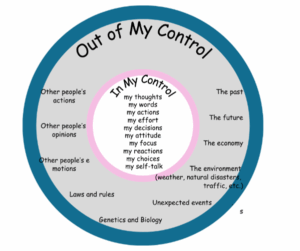 Often in life we seek to gain control even over things that are not in our control. This can serve us at times but there comes a point where this need for control can take its toll on us and cause suffering. In this month’s mentor article, we will take a closer look at control and ways to accept what you can’t control. In doing so, we can strengthen our mental, physical, emotional & spiritual wellbeing and promote balance in our lives. There are several strategies that can be used in therapy or in your own self-help journey. This month’s article will focus on radical acceptance as a strategy for accepting what you can’t control as well as Acceptance and Commitment Therapy (ACT).
Often in life we seek to gain control even over things that are not in our control. This can serve us at times but there comes a point where this need for control can take its toll on us and cause suffering. In this month’s mentor article, we will take a closer look at control and ways to accept what you can’t control. In doing so, we can strengthen our mental, physical, emotional & spiritual wellbeing and promote balance in our lives. There are several strategies that can be used in therapy or in your own self-help journey. This month’s article will focus on radical acceptance as a strategy for accepting what you can’t control as well as Acceptance and Commitment Therapy (ACT).
The desire for control is not entirely a “bad” thing. In fact, when looking at control from an evolutionary perspective, the desire for control is a deeply ingrained human tendency that serves as a primitive safety response. Whether real or perceived, controlling certain aspects of our environments or attempting to predict outcomes can reduce uncertainty or increase a sense of security. While some degree of control can help to navigate life’s challenges it can become detrimental when it is excessive and maladaptive.
This is where tools such as radical acceptance can help to lessen the uneasiness or resistance that often comes with accepting what we can’t control. Simply put, radical acceptance means accepting difficult situations as they are in the moment, today, in an effort to reduce distress. Radical acceptance helps us to fully acknowledge the facts of our lives, even the parts that we don’t like to reduce emotional suffering.
When experiencing difficult emotions, practicing radical acceptance allows us to meet them with compassion. Radical acceptance requires a conscious effort to acknowledge and honor difficult situations and emotions. Radical acceptance is not approval, but rather completely and totally accepting with our mind, body and spirit that we cannot currently change the present facts, even if we do not like them.
The book, “Be Water My Friend” by Bruce Lee provides helpful insights that relate to radical acceptance. Principles of adaptability and flexibility are emphasized, encouraging individuals to flow around obstacles and embrace change rather than resisting it. When practicing radical acceptance, the author draws a parallel to how water doesn’t judge a situation, one should accept what is and move forward without resistance. This acceptance is not passive or looking for approval but rather a powerful way to navigate challenges and find solutions. More information about this book can be found at: Be Water My Friend: Bruce Lee.
Another resource that you can read more about is called “the circle of control”. This is an exercise and tool that can be useful when thinking about stressors and what we can versus cannot control. It sometimes can be helpful to use a visual aid or to draw circles and list things we can and cannot control related to the present stressor. For more information click here: https://positivepsychology.com/circles-of-influence/

Lastly, we will briefly touch on Acceptance and Commitment Therapy (ACT) which can be helpful on its own or when paired with radical acceptance and circles of control. ACT combines mindfulness and acceptance as a way to observe thoughts and feelings without judging or trying to change them. In doing so it allows individuals to experience more flexibility in their thoughts and emotions which in turn can help with making decisions that align with our values. Some of the key components of ACT include identifying values, being present and making committed and meaningful actions that align with our values. If you find yourself interested in learning more about ACT click this link for more information: https://www.youtube.com/watch?v=ScwXgqO_d7Y.
If you or someone you know is struggling with mental health challenges due to life stressors and coping with change our counselors at Capital EAP are ready and available to help guide you on this journey. You can reach out to us at 518-465-3813 to connect with our intake team, who can help you set up an appointment.
By: Meryl Tremblay, LMSW, EAP Counselor
